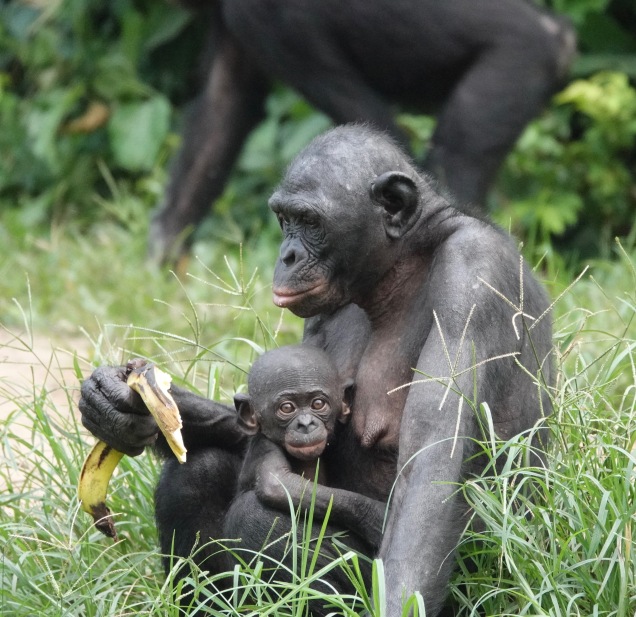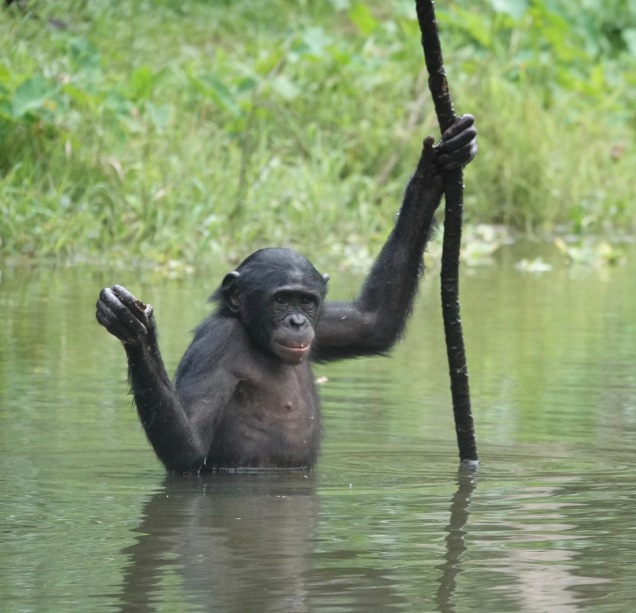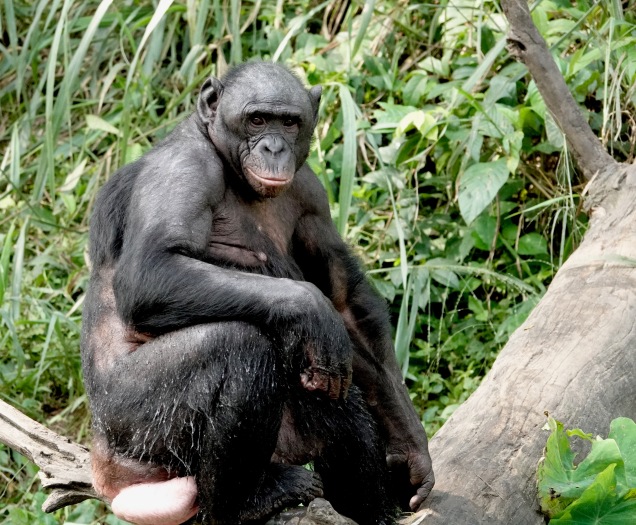 I’m not a wildlife expert, and maybe even the experts don’t know what the future holds for bonobos. But what I want to say is: after visiting the Congo, I feel optimistic.
I’m not a wildlife expert, and maybe even the experts don’t know what the future holds for bonobos. But what I want to say is: after visiting the Congo, I feel optimistic.
That may be naive. The DRC is one of the most corrupt countries on earth. Its national politics are still in turmoil. Atrocities continue to unfold in the war-torn east, where Ebola has broken out again. And yet… the biggest threat to bonobos isn’t habitat loss, as it is for so many animals in so many places. Congo still has plenty of equatorial rainforest where bonobos can thrive. The bonobo population has plunged because Congolese people eat them. And even that isn’t as bad as it sounds. People don’t think bonobos are endowed with any magical properties (like rhinos, for example, burdened with their theoretically aphrodisiacal horns.) Bonobos are just meat, for which Africans have a big appetite.
Still, just as most humans (even hungry ones) don’t eat other humans, when people learn how similar bonobos are to humans, they can change their minds about bonobos’ place on the menu. And if protecting bonobos instead of eating them can make communities more prosperous, folks can be marshaled to protect them.
 Suzy Kwetuenda at Lola ya Bonobo has spent countless hours talking to Congolese villagers in the rainforest about why bonobos deserve protection. She says some of them bristle at the notion of outsiders trying to stop them from eating their bush meat. But she retorts, “You know, we are lucky to be the only ones in the world to have bonobos! They are very precious. The BIG value of bonobos is not in your stomach! It’s very important to have bonobos for development. If you protect them, this area will have more and more visitors. They will come and help you!”
Suzy Kwetuenda at Lola ya Bonobo has spent countless hours talking to Congolese villagers in the rainforest about why bonobos deserve protection. She says some of them bristle at the notion of outsiders trying to stop them from eating their bush meat. But she retorts, “You know, we are lucky to be the only ones in the world to have bonobos! They are very precious. The BIG value of bonobos is not in your stomach! It’s very important to have bonobos for development. If you protect them, this area will have more and more visitors. They will come and help you!”
This has always been a core premise of the Lola team: that the communities surrounding any bonobo release site must see concrete benefits from fighting against the hunters and poachers. Les Amies des Bonobos du Congo and its US-based fundraising arm, Friends of Bonobos, don’t have huge budgets. The money has come mostly from small and medium-sized donors. But a part of those limited resources has been devoted to improving the schools, infrastructure, health care and other services near the Ekola ya Bonobo release site. In the ten years since the Lola team began releasing bonobos back into the wilderness, more and more of the bonobos’ neighbors have become believers.
I’ve seen first-hand how a similar approach has worked in Uganda. There tourists who come from around the world to see mountain gorillas have become an engine of prosperity. Ugandan communities that have benefited now see the animals as a priceless resource. It’s possible to imagine something similar unfolding in the Congo.

What Claudine Andre has accomplished in the last 25 years also fills me with admiration and awe. Starting from nothing, she’s built a team that’s adept at saving baby bonobos on the verge of death. These survivors now routinely thrive in the garden that is Lola. The team also now knows what’s required to successfully reintroduce these very special creatures into the wild. (Only one of the 60-odd reintroduced bonobos has died, a youngster who was bitten by a poisonous snake.) And back at Lola more than 30,000 Congolese school kids already have visited Lola and been inspired by these stories.
It saddens me that so many people still don’t know what bonobos are. (I’ve gotten a lot of blank stares when I’ve mentioned our recent travel plans.) But that can change. A hundred years ago no one had heard of pandas. 
A hundred years from now our closest animal relatives could be thriving in the African rainforests, showing us a different model for primate behavior than that demonstrated by chimpanzees and us. If that happens, a lot of things will have made it happen.
Some have already unfolded. Claudine has already dedicated a big chunk of her life to the bonobos’ preservation. Field researchers and veterinarians and the sanctuary crew and others have already learned a lot about what it takes to keep bonobos flourishing. But more will be required. Humans all over the planet will need to recognize bonobos as readily as they do pandas, and many will donate money to help them out. Congolese people will have to learn to treasure them.
That would be the happy ending to the bonobos’ story. Maybe it won’t come to pass, but it should. I’m hoping it will.
Great post, Jeannette
Thanks, Rich! That’s particularly high praise, coming from you!